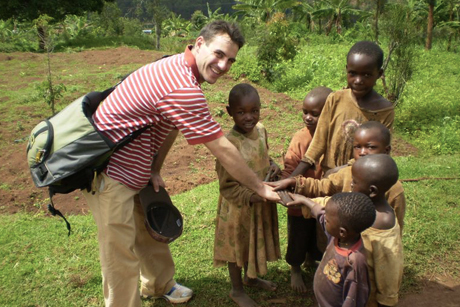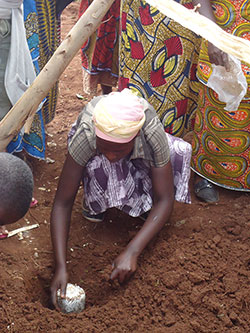Grad student helps Rwandan women grow mushrooms
By Alex Koeberle

The Rwandan genocide of 1994 scarred its people and its landscape. Cornell graduate student Bryan Sobel is trying to help heal both -- using mushrooms.
Sobel, a graduate student in the field of horticulture, recently spent two weeks promoting mushroom cultivation to women farmers in the central African republic. The short-cycle, high-yield crop could offer a profitable complement to traditional crops in an economy largely driven by subsistence agriculture.
It could also help solve another problem in the area: deforestation.
"Cultivating mushrooms are an important step as they increase organic matter lost to deforestation," Sobel said. "This, in turn, can increase the capacity to plant more permanent crops."
The genocide that killed an estimated 500,000 to 1 million people has left 50,000 widows, and women now play an important role in agricultural production and food provision for their families. Working with the Sustaining Rwanda Youth Organization, Sobel trained nearly 100 women to cultivate oyster mushrooms (Pleurotus ostreatus), an abundant and easy-to-grow variety that provides nearly as much protein as meat but is much cheaper.
Women with malnourished children are able to participate in this program by first attending 10 weeks of maternal and child feeding classes, then joining a village cooperative recognized by the federal government.

"My work is aimed at improving malnutrition, poverty and deforestation, empowering locals to build a more robust future," Sobel said.
Most of Sobel's visit was spent near Butare, a small city in southern Rwanda. A mushroom pilot project was constructed adjacent to the community church, a central building for community members to gather.
Sobel was initially challenged by differences in mushroom cultivation. At Cornell he studies cultivation of mushrooms grown in controlled environments and plots in Cornell's Arnot Teaching and Research Forest in Van Etten, N.Y. In Rwanda, the mushrooms are grown in white tubes, or "spawn bags," which are placed directly in the soil.
Once he mastered the technique, he was able to advise the women in other aspects of cultivation, such as proper maintenance and harvesting. Teaching Rwandan women how to profit from excess yields is essential for long-term resilience for individuals and the community, he said.
"It is hard to promote capacity without cultivating dependence," Sobel said. "A benefit of this project is that local Rwandans learn to grow and harvest mushrooms for their own consumption as well as earn money by selling to local markets."
A highlight of the trip was cooking harvested mushrooms as a group, Sobel said. Mushrooms are high-value commodities, yet they are also an integral part of the culture, typically eaten on Sundays and holidays.
"We all live in one world. All life is interrelated, and this experience gave me a more informed perspective," Sobel said.
Sobel's work was supported by a grant from the Trellis Fund, a U.S. Agency for International Development Horticulture Collaborative Research Support program. In addition to hands-on volunteer experience, recipients provide six months of technical support. Sobel will continue to work with the women as they market their mushrooms, address nutrition-related objectives and tackle technical problems like termite infestations.
"I could tell that the women were very excited to learn to grow mushrooms and that they recognized this as valuable knowledge," Sobel said. "I think that I have given them the opportunity to make a difference. You can't go and make a difference in lives in two weeks. This is their project, and now it is up to them."
Alex Koeberle '13 is a student writer for the College of Agriculture and Life Sciences.
Media Contact
Get Cornell news delivered right to your inbox.
Subscribe